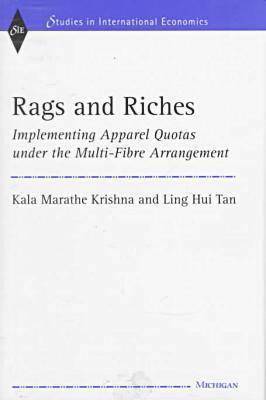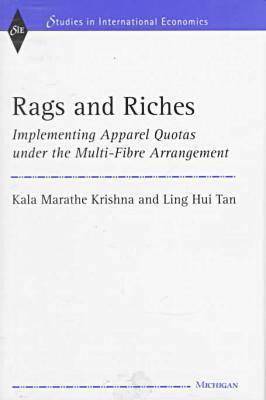
- Retrait gratuit dans votre magasin Club
- 7.000.000 titres dans notre catalogue
- Payer en toute sécurité
- Toujours un magasin près de chez vous
- Retrait gratuit dans votre magasin Club
- 7.000.0000 titres dans notre catalogue
- Payer en toute sécurité
- Toujours un magasin près de chez vous
Rags and Riches
Implementing Apparel Quotas Under the Multi-Fibre Arrangement
Kala Marathe Krishna, Ling Hui Tan
161,45 €
+ 322 points
Description
The Multi-Fibre Arrangement (MFA) is among the most important nontariff trade barriers facing developing countries today. Originating more than twenty years ago, it uses product-specific quotas intended to encourage the expansion of trade, reduce barriers, and further the liberalization of world trade in textile products. It has been argued, however, that the MFA may cut off access to major export markets for developing countries, thereby short-circuiting their industrialization process at an early stage.
The authors endeavor to fill several gaps in the literature on the MFA. First, they more closely examine the various quota implementation rules and their implications by describing how the details of quota implementation differ across countries, modeling some aspects of implementation, and attempting to relate some of the results to actual data. Second, by considering alternative theoretical setups and undertaking some simple econometric tests, they look into the possibility that exporting countries may be receiving less quota rent than suggested by the standard competitive model. A selected number of exporters to the United States--including Hong Kong, Korea, Indonesia, India, and Mexico--serve as case studies.
Kala Krishna and Ling Hui Tan conclude that the process of quota implementation begins with an initial system of regulations, drawn up in order to meet certain desirable objectives. But over time, as loopholes are discovered in the system, additional layers of regulation continue to be introduced, resulting in a complicated, discretionary system that no longer meets the original objectives.
Kala Krishna is Professor of Economics, Pennsylvania State University. Ling Hui Tan is an Economist, International Monetary Fund.
The authors endeavor to fill several gaps in the literature on the MFA. First, they more closely examine the various quota implementation rules and their implications by describing how the details of quota implementation differ across countries, modeling some aspects of implementation, and attempting to relate some of the results to actual data. Second, by considering alternative theoretical setups and undertaking some simple econometric tests, they look into the possibility that exporting countries may be receiving less quota rent than suggested by the standard competitive model. A selected number of exporters to the United States--including Hong Kong, Korea, Indonesia, India, and Mexico--serve as case studies.
Kala Krishna and Ling Hui Tan conclude that the process of quota implementation begins with an initial system of regulations, drawn up in order to meet certain desirable objectives. But over time, as loopholes are discovered in the system, additional layers of regulation continue to be introduced, resulting in a complicated, discretionary system that no longer meets the original objectives.
Kala Krishna is Professor of Economics, Pennsylvania State University. Ling Hui Tan is an Economist, International Monetary Fund.
Spécifications
Parties prenantes
- Auteur(s) :
- Editeur:
Contenu
- Nombre de pages :
- 264
- Langue:
- Anglais
- Collection :
Caractéristiques
- EAN:
- 9780472109340
- Date de parution :
- 09-11-98
- Format:
- Livre relié
- Format numérique:
- Genaaid
- Dimensions :
- 161 mm x 236 mm
- Poids :
- 589 g

Les avis
Nous publions uniquement les avis qui respectent les conditions requises. Consultez nos conditions pour les avis.






